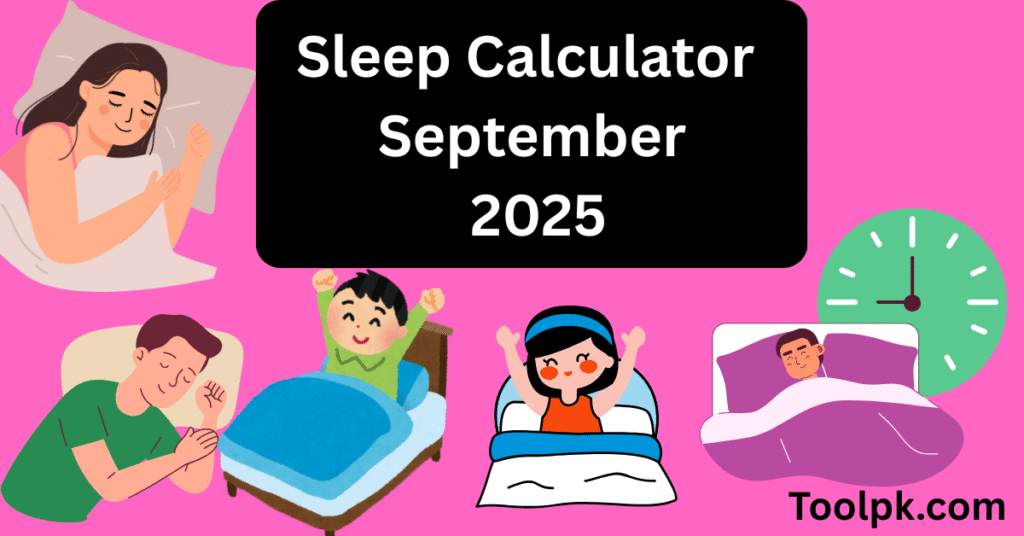Sleep Calculator September 2025
Sleep Calculator September 2025

Sleep Calculator 2025
Optimize your sleep cycles and wake up refreshed! Calculate the perfect bedtime or wake-up time based on 90-minute sleep cycles.
⏰ When Should I Sleep?
🌅 When Should I Wake Up?
⏰ Sleep Alarm
Wake Up!
It’s time to wake up! Hope you had a great sleep! 🌅
💡 Sleep Optimization Tips
90-Minute Cycles
Sleep occurs in 90-minute cycles. Waking up at the end of a cycle helps you feel more refreshed.
Cool Environment
Keep your bedroom between 60-67°F (15-19°C) for optimal sleep quality.
No Screens
Avoid screens 1 hour before bed to reduce blue light exposure.
Support This Tool
If this sleep calculator helped you, consider supporting its development!
Sleep Calculator September 2025: Your Guide to a Better Night’s Rest
Ever feel like you’ve slept for eight hours but still wake up groggy? It’s a frustrating experience many of us face, and it often has less to do with the quantity of sleep and more to do with its quality. This is where a sleep calculator for September 2025 comes in.
This post will explore how a sleep calculator works, why it’s a game-changer for your mornings, and provide a practical guide to optimizing your sleep schedule for the new month. By understanding your body’s natural sleep cycles, you can start waking up feeling truly refreshed and ready to tackle the day.
How a Sleep Calculator Actually Works
A sleep calculator isn’t magic; it’s based on the science of your body’s sleep cycles. A typical sleep cycle, which includes both non-REM and REM sleep, lasts for approximately 90 minutes. To feel your best, the goal is to wake up at the end of a cycle, rather than in the middle of a deep sleep phase.
The calculator simply does the math for you. It determines the best times for you to go to bed or wake up by adding 90-minute increments to ensure you complete a full number of cycles (ideally 5 or 6 for most adults). This helps you avoid the dreaded “sleep inertia,” that groggy feeling that comes from being yanked out of a deep sleep.
Why Your Sleep Cycles Matter
Waking up at the right time is crucial for mental and physical well-being. Here’s a quick look at why aligning with your sleep cycles is so important:
- Improved Alertness: Waking up from a light sleep phase leaves you feeling more alert and ready to go.
- Better Mood: A consistent sleep schedule and refreshed mornings can lead to a more positive outlook throughout the day.
- Enhanced Cognitive Function: Quality sleep is vital for memory consolidation and focus, helping you perform better at work or school.
A Practical Sleep Schedule Table for September
Here is a simple, mobile-friendly table to help you plan your September sleep schedule. It’s based on the 90-minute sleep cycle theory, assuming an average time of 15 minutes to fall asleep.
| Desired Wake-Up Time | Go to Bed (5 Cycles / 7.5 hrs) | Go to Bed (6 Cycles / 9 hrs) |
| 6:00 AM | 10:30 PM | 9:00 PM |
| 6:30 AM | 11:00 PM | 9:30 PM |
| 7:00 AM | 11:30 PM | 10:00 PM |
| 7:30 AM | 12:00 AM | 10:30 PM |
| 8:00 AM | 12:30 AM | 11:00 PM |
| 8:30 AM | 1:00 AM | 11:30 PM |
| 9:00 AM | 1:30 AM | 12:00 AM |
Note: These times are approximate. Adjust your bedtime to find what feels best for your unique body clock.
Beyond the Calculator: Tips for Better Sleep Quality
While using a sleep calculator is a great start, a holistic approach to sleep hygiene will provide the best results. Consider these additional tips:
- Maintain a Consistent Schedule: Go to bed and wake up at the same time every day, even on weekends. This helps regulate your body’s internal clock.
- Create a Relaxing Routine: Wind down before bed with activities like reading a book, meditating, or taking a warm bath.
- Optimize Your Bedroom: Make your room a sanctuary for sleep. Ensure it is dark, quiet, and cool.
- Limit Stimulants: Avoid caffeine and alcohol, especially in the hours leading up to bedtime.
For more expert insights on improving your sleep, consider exploring resources from reputable sources like the National Sleep Foundation or the National Heart, Lung, and Blood Institute.
Frequently Asked Questions (FAQs)
Q: What time should I go to bed if I want to wake up at 7 a.m.?
A: Based on a 90-minute sleep cycle, to wake up refreshed at 7 a.m. you should aim to fall asleep at either 10:00 p.m. (for a 9-hour sleep) or 11:30 p.m. (for 7.5 hours). Remember to factor in a 15-minute buffer to fall asleep.
Q: How many hours of sleep do adults need?
A: Most adults need between 7 and 9 hours of quality sleep per night. The exact amount can vary from person to person, so listening to your body is key to determining your ideal sleep duration.
Q: Is it bad to wake up in the middle of a sleep cycle?
A: Waking up in the middle of a sleep cycle, particularly from the deep sleep stage, can lead to a feeling of grogginess and disorientation, often called “sleep inertia.” This is why a sleep calculator is so useful.
Q: What is the 90-minute sleep cycle rule?
A: This rule is based on the idea that the human sleep cycle, which includes stages of light, deep, and REM sleep, lasts for approximately 90 minutes. Waking up after a full cycle is believed to be more refreshing.
Q: How long does it take to fall asleep?
A: On average, it takes a healthy adult around 10-20 minutes to fall asleep. This is an important factor to consider when using a sleep calculator to determine your ideal bedtime.
Q: Can a sleep calculator help with insomnia?
A: While a sleep calculator can help with planning your schedule, it’s not a treatment for clinical insomnia. If you consistently struggle with falling or staying asleep, it’s best to consult a healthcare professional.
Q: Does napping affect my sleep cycles?
A: Yes, naps can affect your sleep. A short, 20-minute power nap can be beneficial, but a longer nap of 90 minutes or more could potentially interfere with your nighttime sleep schedule.
Q: What are the stages of sleep?
A: There are four stages of sleep: three non-REM (NREM) stages and one REM stage. NREM sleep transitions from light to deep sleep, while REM sleep is associated with dreaming and heightened brain activity.
Q: How can I improve my sleep quality instantly?
A: To instantly improve sleep quality, try reducing screen time an hour before bed, keeping your room cool and dark, and engaging in a relaxing activity like reading or listening to calm music.
Q: What if I can’t fall asleep at the time the calculator suggests?
A: If you find yourself unable to fall asleep at the suggested time, don’t just lie there. Get up and do a relaxing activity until you feel tired, then try again. Forcing yourself to sleep can create anxiety and make the problem worse.
Conclusion
The Sleep Calculator for September 2025 is more than just a tool; it’s a way to take control of your sleep and, by extension, your well-being. By understanding the science of sleep cycles and using this practical guide, you can start the month off right, feeling more energized and focused.
We encourage you to use the table provided, experiment with your sleep schedule, and share your experiences in the comments below! What time works best for you?

Hello Friends!
My name is Majid Farooq, reading books and gaining knowledge about Tools and their conditions is my passion and I am here to share my knowledge and experience with you. I hope it’s very helpful for you.
Thank you very much.